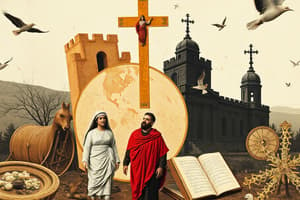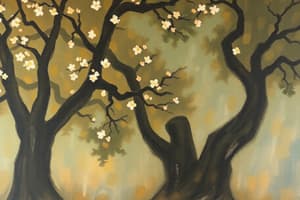Podcast
Questions and Answers
What is one primary tool used in literature to explore human experience and emotions?
What is one primary tool used in literature to explore human experience and emotions?
- Imagery
- Structure
- Rhythm
- Language (correct)
Which literary genre is characterized by dialogue between characters and is intended for performance?
Which literary genre is characterized by dialogue between characters and is intended for performance?
- Prose fiction
- Drama (correct)
- Essay
- Poetry
What significant aspect does the structure of a plot usually include?
What significant aspect does the structure of a plot usually include?
- Imagery
- Symbolism
- Character development
- Beginning, middle, and end (correct)
How does historical context affect literature?
How does historical context affect literature?
What role do literary devices like metaphor and simile play in literature?
What role do literary devices like metaphor and simile play in literature?
Which critical approach focuses on understanding literature through the author's life and experiences?
Which critical approach focuses on understanding literature through the author's life and experiences?
What effect does literature have on critical thinking in readers?
What effect does literature have on critical thinking in readers?
Which of the following is NOT a key literary genre mentioned?
Which of the following is NOT a key literary genre mentioned?
Flashcards
What is Literature?
What is Literature?
The study of written works, including poems, novels, essays, and plays, which often explore human experiences, emotions, and ideas using language as its primary tool.
What are Literary Genres?
What are Literary Genres?
Different categories of written works, each with its own style, content, and purpose. Examples include fiction, non-fiction, poetry, drama, and others.
What is Author's Intent?
What is Author's Intent?
The author's purpose or message they aim to convey through their work.
What are Themes and Motifs?
What are Themes and Motifs?
Signup and view all the flashcards
What is Character Development?
What is Character Development?
Signup and view all the flashcards
What is Structure and Form?
What is Structure and Form?
Signup and view all the flashcards
What is Style and Language?
What is Style and Language?
Signup and view all the flashcards
What are Literary Devices?
What are Literary Devices?
Signup and view all the flashcards
Study Notes
Definition and Scope
- Literature encompasses any written work, from poems and novels to essays and plays.
- It often explores human experience, emotions, and ideas, using language as a primary tool.
- Different genres exist, including fiction, non-fiction, poetry, drama, and others.
Historical Context
- Literature has evolved throughout different historical periods, reflecting social, political, and cultural changes.
- Ancient literature, for example, shows a distinct difference in form and content compared to the literature of the Middle Ages.
- Modern literary trends continue to develop and adapt to changing circumstances.
Elements of Literary Analysis
- Authors' intent often influences the narrative.
- Themes and motifs frequently appear and are explored in-depth.
- Character development allows readers to understand characters and the conflicts they face.
- Structure and form, like plot and narrative, are key to conveying a story or message.
- Style and language are crucial for establishing tone and mood, creating imagery and figurative language.
- Literary devices such as metaphor, simile, and symbolism are used to enhance meaning.
- Plot structure usually consists of a beginning, middle, and end.
Key Literary Genres
- Poetry: Primarily uses aesthetic qualities in language, often employing rhyme, rhythm, and imagery.
- Drama: A genre that focuses on dialogue between characters, intended to be performed.
- Prose Fiction: This genre encompasses novels and short stories.
- Essays: Usually non-fiction works that explore an idea, often with descriptive arguments and examples.
- Biographies and Autobiographies: Detailed accounts of a person's life, experiences, and accomplishments.
Critical Approaches to Literature
- Literary criticism provides a deeper understanding of a work.
- Different methods may be used, including historical, biographical, psychological, feminist, and others.
- Analyzing these elements often reveals new insights into the work's purpose and intent.
Impact and Significance
- Literature provides insights into different cultures, perspectives, and human behavior across eras.
- It allows individuals to explore different points of view and experience vicariously various experiences.
- Many works of literature remain relevant and influential after their initial publication.
- It frequently fosters critical thinking by prompting readers to consider complex themes and ideas.
Studying That Suits You
Use AI to generate personalized quizzes and flashcards to suit your learning preferences.




